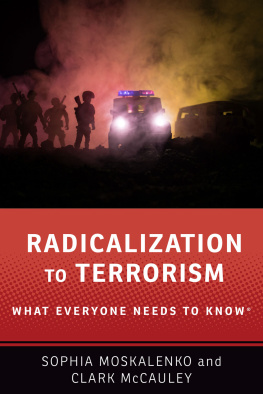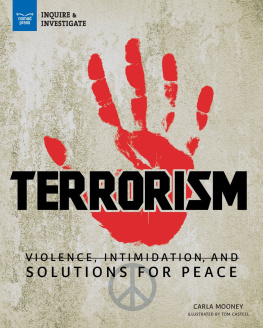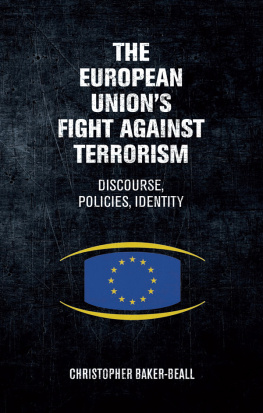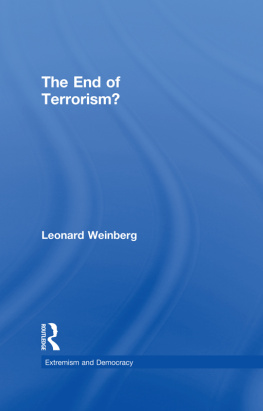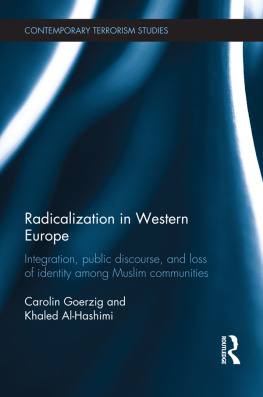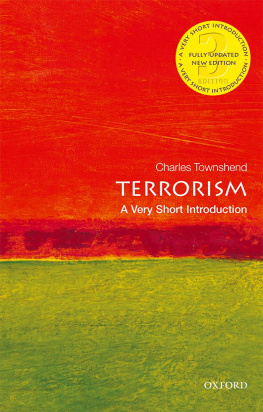RADICALIZATION TO TERRORISM
WHAT EVERYONE NEEDS TO KNOW

Oxford University Press is a department of the University of Oxford. It furthers the Universitys objective of excellence in research, scholarship, and education by publishing worldwide. Oxford is a registered trade mark of Oxford University Press in the UK and certain other countries.
What Everyone Needs to Know is a registered trademark of
Oxford University Press.
Published in the United States of America by Oxford University Press
198 Madison Avenue, New York, NY 10016, United States of America.
Oxford University Press 2020
All rights reserved. No part of this publication may be reproduced, stored in a retrieval system, or transmitted, in any form or by any means, without the prior permission in writing of Oxford University Press, or as expressly permitted by law, by license, or under terms agreed with the appropriate reproduction rights organization. Inquiries concerning reproduction outside the scope of the above should be sent to the Rights Department, Oxford University Press, at the address above.
You must not circulate this work in any other form and you must impose this same condition on any acquirer.
Library of Congress Cataloging-in-Publication Data
Names: Moskalenko, Sophia and McCauley, Clark, authors.
Title: Radicalization to terrorism : what everyone needs to know /
Sophia Moskalenko and Clark McCauley.
Description: New York, NY : Oxford University Press, [2020] |
Includes bibliographical references and index. |
Identifiers: LCCN 2019032299 (print) | LCCN 2019032300 (ebook) |
ISBN 9780190862596 (hbk) | ISBN 9780190862589 (pbk)
ISBN 9780190862619 (epub) | ISBN 9780190862602
Subjects: LCSH: Radicalism. | Radicalization. | Terrorism.
Classification: LCC HN49.R33 .M675 2020 (print) | LCC HN49.R33 (ebook) |
DDC 303.48/4dc23
LC record available at https://lccn.loc.gov/2019032299
LC ebook record available at https://lccn.loc.gov/2019032300s
Contents
In recent years, terrorism and radicalization have (unfortunately) become something of a regular topic in the news, in movies and TV shows, and even in dinnertime conversations. It seems like everyone knows something and has a theory or two to explain the growing number of terrorist attacks around the world. Some blame it on Muslims, some on the news media and the internet, and some on the Central Intelligence Agency and the US government. It has become difficult to judge the quality of all this information. Thus, it makes sense to ask for credentials of the messengers.
We are social psychologists who have dedicated our careers to studying the psychological processes that underlie transitions to radicalism and terrorism. Clark McCauley was among the first psychologists to focus on terrorism, publishing and lecturing on the psychology of terrorism since the 1980s. Sophia Moskalenko became interested in the topic when she was a student of McCauleys at Bryn Mawr College in the 1990s.
Together we have authored a number of articles and books on the psychology of terrorism and radicalization, including the most cited article in the history of the main academic journal that focuses on terrorism, Terrorism and Political Violence.the media, including radio shows, television news shows, and newspapers, as well as by the US Department of Homeland Security, the US Department of Defense, and other government agencies.
Academics dont like to admit to biases. We like to think we are led only by the facts before us. However, being an academic creates a bias of its own. We approach social problems with the assumption that there is an explanation for what we are seeingan explanation that is testable and falsifiable, one that can be confirmed by other researchers looking at the same problem.
For those who study terrorism, this bias means that we do not accept explanations of terrorism that border on mystical (terrorists are evil) or that are too vague to be tested (terrorists are crazy).
Another bias of academics is to try not to reinvent the wheel. It has been said that the goal of science is to explain as many phenomena as possible with as few ideas as possible. We like to draw upon the body of knowledge already accumulated by social science rather than trying to invent new explanations that relate only to the facts of radicalization and terrorism. In other words, we aim to integrate terrorism research inquiry into the more established branches of social science.
There are good and bad consequences of this scientific approach. The good is that there is an economy of terminology and concepts. If an aspect of terrorism is like something already found in the vast library of social sciences (e.g., violence and aggression), we can take the terms and results of studies that were already done and use these to understand terrorism. The bad consequence is that existing social science may miss something important about how individuals and groups move to political violence. That is, concepts and results from existing social science may miss something unique about the psychology of terrorists. We are willing to accept the possibility of missing something unique in order to obtain the value of applying knowledge already available.
Our bottom line is that the concepts and results of social science are our best tools for understanding terrorism. Even if the data are limited and the theories are still evolving, scientific inquiry continues to refine them, independent of public opinion and political climate. The alternative is to rely on pundits opinions, on journalists sensationalist headlines, and on politicians self-serving interpretations of terrorism. These are not likely to be sufficient to understand the complexities of how normal people are moved to abnormal violence.
We are not theologians and cannot speculate on whether or how certain sacred texts justify radicalization and terrorism. For psychologists, the more interesting question has to do with what is happening to people who decide to take up radical activity, whether they pledge allegiance to Islam, Buddhism, communism, anarchy, or white supremacy.
Psychology has demonstrated again and again that people tend to justify and intellectualize choices and actions they take for reasons that have little to do with their justifications. When we say we do something for a particular reason, very often we are wrong.
For example, we are more likely to like a stranger we meet while we are holding a warm cup of coffee than a stranger we meet while holding a cold cup of coffee. But, if asked why we liked the stranger, we are not going to mention the cup of coffee, offering instead explanations that have to do with the stranger or with our own character.Similarly, radicals and terrorists sometimes use ideology to justify choices they make for reasons that have little to do with religion or politics.
Because we are not politicians, we have the luxury to leave aside moral questions related to radicalization: Who is right and who is wrong? Who started the violence? Who has the right to escalate violence? Who should be responsible for ending violence? Questions like these are beyond the scope of this book. Both terrorists and states have moral arguments for violence. Collateral damage of drone attacks is justified by governments that wage wars in terrorists homelands; collateral damage of suicide bombing is justified by terrorists who wage wars in Western cities. Violence is gruesome and not easy for an average person to undertake. As psychologists, we are drawn to the mystery of how and why people cross over the threshold that makes violence acceptable.

